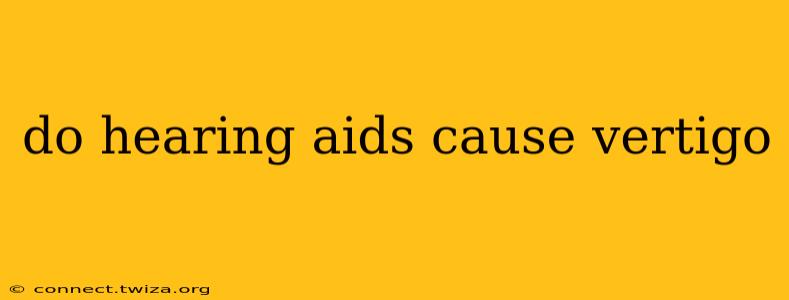Do Hearing Aids Cause Vertigo? Understanding the Connection
Vertigo, that unsettling sensation of spinning or the room moving around you, can be a debilitating experience. It's natural to wonder if something like a hearing aid, a device placed so close to the inner ear, might be a contributing factor. While hearing aids themselves don't directly cause vertigo, the relationship is more nuanced and warrants careful consideration. This article explores the potential links between hearing aids and vertigo, offering clarity and addressing common concerns.
Can a Hearing Aid Make Vertigo Worse?
This is a crucial question. While a hearing aid won't initiate vertigo in a healthy individual, it can potentially exacerbate existing vestibular issues. The inner ear houses both the hearing and balance organs. If you already suffer from vertigo or a balance disorder like Meniere's disease, the pressure changes or slight alterations in inner ear positioning from a hearing aid could trigger or worsen symptoms. This is particularly true with ill-fitting devices.
What Types of Hearing Aids are Less Likely to Cause Vertigo?
The design and fit of the hearing aid play a significant role. Custom-fit hearing aids, molded to the individual's ear canal, generally minimize the chance of discomfort or pressure changes that could trigger vertigo. Conversely, behind-the-ear (BTE) styles, while offering advantages in other areas, might be more prone to causing issues for individuals prone to vertigo, particularly if not fitted precisely. The size and placement of the hearing aid also matter; larger devices may exert more pressure.
Are There Specific Hearing Aid Features that Might Trigger Vertigo?
Some advanced features, such as directional microphones that focus on sounds from a specific direction, may slightly alter the perceived spatial sound environment. While not a direct cause of vertigo, this change can potentially disorient some individuals, especially those with pre-existing balance problems. However, this is usually a temporary adjustment period, and the benefits of improved hearing often outweigh this minor side effect.
How Can I Minimize the Risk of Vertigo with Hearing Aids?
The key lies in proper fitting and adjustment. A thorough audiological examination is crucial to identify any underlying vestibular conditions. Your audiologist should assess your balance and discuss your concerns openly. They will select the most appropriate type and style of hearing aid to minimize the risk of triggering vertigo symptoms. Gradual acclimatization is also important. Start with shorter wearing times and gradually increase the duration to allow your body to adapt.
What Should I Do if My Hearing Aid Seems to Trigger Vertigo?
If you experience vertigo or dizziness related to your hearing aids, contact your audiologist immediately. They can check the fit, adjust settings, or explore alternative solutions. It’s vital to address this promptly, as persistent vertigo can be debilitating. They may also recommend consulting an ENT specialist to rule out other underlying causes of your balance problems.
What are the common causes of vertigo unrelated to hearing aids?
It's essential to remember that vertigo has many potential causes unrelated to hearing aids. These include:
- Inner ear infections: Inflammation can affect the balance organs.
- Benign paroxysmal positional vertigo (BPPV): Tiny calcium crystals in the inner ear move out of place.
- Meniere's disease: A disorder affecting the inner ear's fluid balance.
- Vestibular neuritis: Inflammation of the vestibular nerve.
- Migraines: Some migraines can cause vertigo.
Always consult a healthcare professional to diagnose the root cause of your vertigo.
In conclusion, while hearing aids themselves do not directly cause vertigo, they can potentially exacerbate existing conditions or trigger discomfort in some individuals. Careful selection, proper fitting, and open communication with your audiologist are vital in minimizing the risk. If you experience vertigo, seek professional medical advice to determine the underlying cause and receive appropriate treatment.
